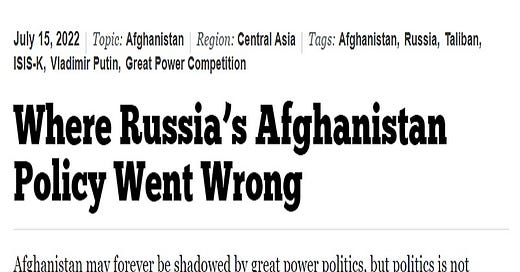The National Interest Couldn’t Be More Wrong About Russia’s Afghanistan Policy
The National Interest’s latest article about Russia’s Afghanistan policy is chock-full of inaccurate assessments that lead to a false conclusion. In hindsight, it appears as though the article was written in reverse: the conclusion was predetermined, after which everything prior was included in order to lead to it.
The National Interest published a piece on Friday titled “Where Russia’s Afghanistan Policy Went Wrong”, which was co-authored by Akram Umarov and Jennifer Brick Murtazashvili, who are the Director of the Afghanistan Research Group at the University of World Economy and Diplomacy in Tashkent and Director of the Center for Governance and Markets and Associate Professor of International Affairs at the University of Pittsburgh respectively.
According to them, Russia’s pragmatic approach to the still-banned Taliban was driven by three reasons and failed to achieve any significant dividends. They write that it was influenced by the US’ unsuccessful two-decade-long war against the Taliban, Russia’s desire to geostrategically compete with America, and an attempt to “demonstrate dominance over Central Asia”. Those two experts also extend credence to the baseless speculation that Russia is secretly backing the “National Resistance Front” (NRF).
Furthermore, the article also claims that Russia is suspicious of equally baseless speculation concerning Chinese military activity in Afghanistan. The conclusion that Umarov and Murtazashvili arrive at is that Russia’s geopolitical competition with others in Central Asia is responsible for destabilizing Afghanistan. Having summarized their main points, the present piece will now comprehensively counter all of their claims in order to prove just how wrong everything in The National Interest’s article is.
First, Russia’s pragmatic approach to the Taliban is driven by the reality of that group being in control of Afghanistan and the need for Moscow to have someone to engage with there in order to contain ISIS-K. Second, the Central Asian Republics (CAR) voluntarily cooperate with Russia by sharing related intelligence and participating in joint military drills because they’re also concerned about that terrorist group’s activities in Afghanistan. None of this has to do with geopolitical competition or “dominance”.
Umarov and Murtazashvili also wrote in their article that Russia is against Central Asian-South Asian connectivity, though that’s factually false as proven by Foreign Minister Lavrov enthusiastically endorsing this last July since it’s in perfect alignment with Moscow’s Greater Eurasian Partnership (GEP). In the past five months since the start of its ongoing special military operation in Ukraine, Russia, India, and Iran even revived the previously stalled North-South Transport Corridor (NSTC) to this end too.
It's true that February 2021’s plan to build a Pakistan-Afghanistan-Uzbekistan (PAKAFUZ) railway seems to have been indefinitely delayed due to the major economic crisis that followed the post-modern coup against former Prime Minister Imran Khan, but that in and of itself isn’t sufficient enough grounds to claim that the entirety of Russia’s Afghanistan policy has failed. In fact, that development had nothing to do with it and was the result of a preplanned regime change operation that also took Moscow off guard.
Moving along, it should be said that those Umarov and Murtazashvili’s speculation about Russia secretly arming the NRF and its suspicions of China’s equally speculative military activity in Afghanistan is just that, speculation. Both claims also contradict those Great Powers’ stated policies: Russia is against anyone waging proxy wars in Afghanistan while China’s only foreign military presence is its naval base in Djibouti. Including those baseless claims in the article is nothing but a form of “information laundering”.
Regarding their conclusion, it’s equally baseless too. Russia isn’t geopolitically competing with anyone in Central Asia, and interpreting its regional partners’ voluntary cooperation with it as such – let alone an intent to “dominate” the region – belies a lack of basic observation skills and/or suggests an ideologically driven agenda behind their article. The objectively existing and easily verifiable reality is that Russia’s Afghanistan policy has succeeded as well as it could under the circumstances.
To explain, the said policy involves encouraging multilateral efforts to stave off that country’s impending humanitarian crisis, which Moscow fears could create space for ISIS-K to expand and thus destabilize the larger region through refugee influxes and terrorist infiltration under that cover. Pragmatically engaging with the Taliban is also intended to explore opportunities for economic cooperation through PAKAFUZ and other projects as well as to share intelligence about ISIS-K.
All of this is proceeding apace and has already resulted in moderate gains, though a lot more of course remains to be done, but that’s outside Russia’s competency. It simply can’t do anything to get the US to unfreeze the several billion dollars of Afghanistan’s foreign assets under Washington’s writ, nor can anyone for that matter. Even so, none of that means that Russia’s Afghanistan policy as failed, it’s just doing the best that it can under the very difficult circumstances in which it’s being promulgated.
To wrap it up, The National Interest’s latest article about Russia’s Afghanistan policy is chock-full of inaccurate assessments that lead to a false conclusion. In hindsight, it appears as though the article was written in reverse: the conclusion was predetermined, after which everything prior was included in order to lead to it. To be fair, it’s also possible that those experts truly misunderstand the subject that they wrote about. Either way, their piece is disappointing and misportrays everything about the issue.




